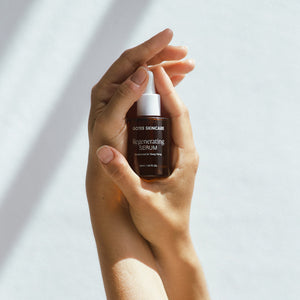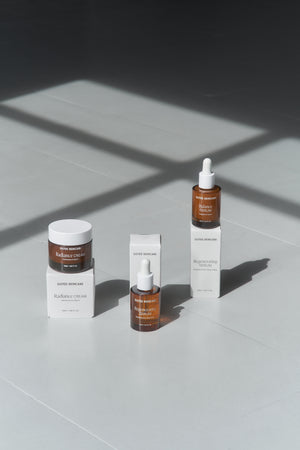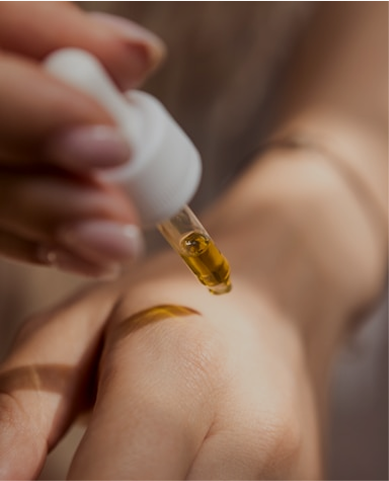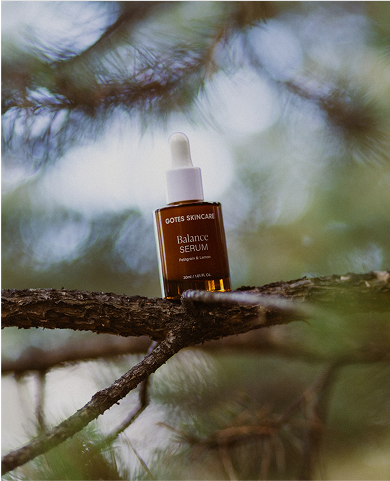¿Qué te preocupa?
¿Cómo se pueden usar los aceites esenciales?
Vía tópica
Vía oral
Vía respiratoria
Los aceites esenciales son compuestos aromáticos volátiles extraídos de plantas a través de métodos como la destilación al vapor o la extracción por presión en frío. Son la esencia concentrada de las plantas, capturando su aroma y propiedades beneficiosas.
Con solo unas gotas, los aceites pueden regenerar, cicatrizar o nutrir la piel, pero también afectan al estado de ánimo pudiendo animar, relajar o concentrar a quien los utiliza. Los aceites esenciales se utilizan de tres maneras: por la vía olfativa, por la vía oral o por la vía tópica.
Los beneficios del aceite esencial están determinados por las propiedades de las plantas. Si estas sustancias naturales se extraen adecuadamente, pueden usarse para ayudarnos a mejorar física, mental y emocionalmente.
Los efectos positivos de aromaterapia se están comprobando finalmente a través de investigaciones clínicas en laboratorios alrededor del mundo, a pesar de que la
utilidad de estos aceites pequeños ha sido conocimiento durante miles de años.
La vía cutánea, también llamada vía tópica, es la principal vía de administración de los aceites esenciales. Esto es el caso tanto a nivel terapéutico como a nivel
cosmético. Lo primero que debes saber sobre esta vía de aplicación es que, por regla general, siempre se deben diluir los aceites esenciales en una base de aceite vegetal antes de aplicarlos sobre la piel. La vía cutánea es considerada como una vía privilegiada. Esto se debe a que presenta pocos riesgos a nivel de
toxicidad siempre y cuando, como ya hemos dicho, el aceite esencial se aplique diluido en un aceite vegetal o aceite base. Además, la vía cutánea permite al aceite esencial pasar rápidamente a la sangre y tener así una acción generalizada sobre el organismo. Algunos síntomas como
el estrés, los traumas circulatorios, la celulitis, las contracturas musculares, las infecciones o las sensaciones de dolor pueden ser tratados eficazmente mediante la aplicación cutánea (diluida) de los aceites esenciales.
Se suele recurrir a esta técnica para desinfectar el ambiente de una sala, para alejar a los insectos, para inducir al sueño, para promover la relajación o, al contrario, para estimular y tonificar. A parte de tener un uso popular en el hogar , la difusión de esencias es cada vez es más utilizada en los centros hospitalarios para prevenir o limitar las infecciones. También hay varios estudios que analizan los efectos relajantes, calmantes y/o tonificantes de algunos aceites esenciales. Los olores actúan como vectores de información hacia el cerebro. Este traduce dicha información en comportamientos fisiológicos. Por todos esos motivos, es importante elegir adecuadamente el
aceite esencial que vas a difundir en función de los objetivos que deseas
cumplir. La mayor diferencia está entre los humidificadores, que utilizan vapor de agua, y los nebulizadores, que difunden el aceite esencial de manera pura. A grandes rasgos, te recomendamos optar por el nebulizador si lo que buscas es sacarle el máximo de provecho a las propiedades terapéuticas y a la fragancia del aceite esencial que difundes.
Esta es la vía más delicada. Está reservada exclusivamente a
los adultos y no se puede usar para todos los aceites esenciales. Además, es importante que te asegures que el aceite esencial específico que tienes se puede utilizar por vía oral. Se suelen ingerir diluidos en aceite de oliva, en una cucharada de miel o sobre un comprimido neutro. Para este tipo de administración se utilizarán, entre otros, los aceites de cítricos, que no presentan grandes riesgos de toxicidad.
Es recomendable consultar con un médico antes de usar los aceites esenciales por vía oral. De la misma manera, es importante elaborar la mezcla con un profesional ya que ciertos aceites esenciales pueden ser altamente tóxicos por vía oral. No se recomiendan los tratamientos a base de aceites esenciales por vía oral que duren más de 7 días.




























